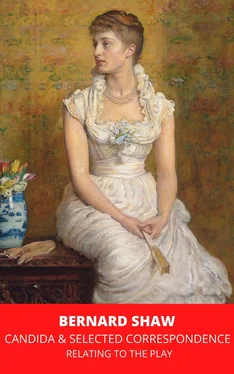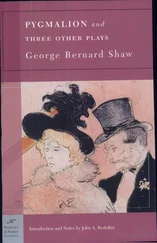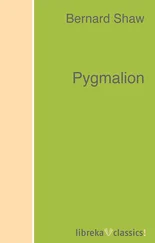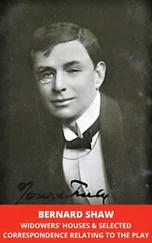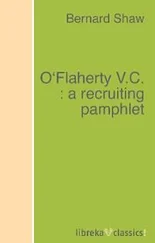Dont be too much puffedup if I break to you the intelligence that you have won the approval of [John Mackinnon] Robertson. He has seen the Devil’s Disciple in Boston & writes of it with what is (for him) enthusiasm—‘the applause of the which one must in your allowance o’erweigh a whole theatre of others.’
Yours ever
W.A.
73/ Bernard Shaw’s article “The Comedy of Calf Love” contributed to a London weekly newspaper The Saturday Review
15th January 1898
The bitterest of prayers is the prayer that our prayers may not be granted; but it has been prayed ever since we discovered that the meanest trick our gods can play us is to take us at our word. This is not altogether because we so seldom know what is good for us: it just as often comes from our not liking what is good for us when we get it. My own case at present is worse even than this. I have unselfishly prayed for something that is good for the theatre; and now that the theatre has got it, it makes life bitterer to me. My prayer was that contemporary drama might be brought up to the level of contemporary fiction. I pointed out that even the romances written by governesses and read by parlormaids were more literate, more decent, more fanciful than the coarse pleasantries and maudlin sentimentalities concocted by obsolete Bohemians for festive undergraduates. Now that the substitution has been effected, I am more than justified; for the change is not only a very manifest improvement, but is much appreciated by the public; yet to say that I enjoy it would be to say the thing that is not. It is not in man’s nature to be grateful for negative mercies. When you have the toothache, the one happiness you desire is not to have it: when it is gone, you never dream of including its absence in your assets. Now that the pothouse drama no longer obtrudes its obscene existence on me, I find myself grumbling as much as ever at the deficiencies of the ladylike plays which have supplanted it.
My consolation is that ladylike drama, though it worries me as a critic, reassures me as a human being. The truth is, I am no longer what is invidiously called a young man. Like Mr [Arthur Wing] Pinero and his Princess [a character of his play The Princess and the Butterfly or the Fantastics ], I have turned forty, and am somewhat worn by industry and eld. Yet I find, by the unanimous testimony of the women who, as purveyors of the newest new drama, are breaking down the male monopoly of dramatic authorship in all directions, that the older I get, and the more I wrinkle, and the faster my grey hairs multiply, and the more flabbily my feet shuffle and my ideas footle, the more I shall be adored by their sex. I used to think that calf love—the only love that deserves all the beautiful things the storybooks say about the tender passion—was peculiar to the human male, and was, indeed, a mark of his superiority. But now I learn, from the latest fashion in plays, that the modern woman’s dream is to be an old man’s darling. In Sweet Nancy [by Robert Williams Buchanan], revived last week at the Avenue [Theatre], there was still one drop of bitterness left for me, since the hero, though fifty, was military. But in A Bachelor’s Romance [by Miss Martha Morton], at the Globe [Theatre], the hero is not only an old fogey, but a literary man, with fads not altogether unlike my own. And the author is no unwomanly Ibsenite, but that womanliest of all women, the American woman. She was born in New York City; she received her education in a public school; and as a girl she contributed poetry and short stories to many magazines. Can anything be more womanly? If A Bachelor’s Romance were her first play, I might misdoubt me that it was no more than the sowing of her wild oats. But it is not so: Miss Martha Morton has produced at least six plays, all apparently successful, since her Refugee’s Daughter appeared eight years ago. Therefore I take the Globe play to be the expression of a mature, deliberate, experienced conviction that the most fascinating person in the world is a nice old literary gentleman between forty and sixty. Later on I may perhaps plead for an extension of these limits, encouraged by the fact that Mr [William Ewart] Gladstone was never positively adored until he turned seventy but for the present I am content to be just such an old dear as Mr [John] Hare [born John Joseph Fairs, 1844–1921] is now impersonating with a success that Don Juan has never attained. And, depend on it, this new dramatic theme will not be confined to one sex. It is in the air. There is a play called Candida , lately performed in the provinces by the Independent Theatre, in which the hero is under eighteen and the heroine a matron who confesses to “over thirty.” Calf love is the sentiment of the hour.
Miss Morton’s success as a playwright is, of course, founded on a clear gift of telling stories and conjuring up imaginary people. But her easy conquest of managerial favor is due to the aptitude with which she sketches congenial and easily acted parts for good actors to fill up, and to that sympathy catching disposition to be goodnatured at all costs, which is so very agreeable to the public just at present. I fancy if Mr Hare had to choose between playing for nothing in three extra performances of A Bachelor’s Romance and carrying his portmanteau from Somerset House to the Globe Theatre, he would unhesitatingly submit to the three perfor-mances. Yes, easy as his task is, he gets as much applause as if the author were taxing his powers as severely as [Henrik] Ibsen. Mr Frederick Kerr, too, achieves an impersonation which, to the very coloring of his face and the thinning on the top of his wig, is masterly, at a cost to himself comparable to the lifting of an egg by [Eugene] Sandow. Miss May Harvey, one of the cleverest actresses we have, is almost dangerously underparted, like a heavy charge in a light gun; and Miss Susie Vaughan would be all the better for a little more stuff in her part to steady her. I confess I grudge four such players to a work so far inside their capacity: I had rather see them all groaning under grievous burthens. And yet I do not see how this flimsy, pretty, amusing, rather tender sort of play is to be worked up to concert pitch without better acting than it is artistically worth. Its commercial value, when fine talents are liberally wasted on it, is beyond question, but as it is not my business to judge plays by the standards of the boardroom and box office, I need not deny that there were moments during A Bache-lor’s Romance when the cheapness and spuriousness of the sentiment provoked a spasm of critical indignation in me. For instance, since Mr Hare has dealt so handsomely with Miss Morton’s plays, she might surely have provided him with some more subtle, or at least more sensible means of securing the sympathy of the audience than handing sovereigns about to needy people like a Jack Tar in a Surreyside nautical melodrama. When Miss Susie Vaughan has to shew that the crusty old maid, Miss Clementina, has what London beggars call a feeling heart, she must be somewhat incommoded by having no more plausible statement to make on the subject than that when she wakes up in the morning she hears Sylvia singing under her window, and cannot tell which is the girl in the garden and which the lark in the heavens. This, I submit, is not poetry: it is gammon; and it destroys the verisimilitude of an otherwise passable character sketch. The play, in short, needs here and there just a little more sincerity to bring it up at all points even to its own impenitently romantic scale of illusion.
The second rank of the company is nearly as good as an ordinary West End front rank. Mr Gilbert Hare [1869–1951] amuses himself cleverly but nonsensically by playing a very old man, a sort of folly in which his father [John Hare] wasted too much of his prime. I challenge Mr Gilbert Hare to look at himself in the glass whilst he is doing that dance—“one, two, three: one, two, three”—in the third act, and to say whether any extremity of white wig and painted wrinkles could turn the quicksilver in his legs into chalkstones.
Читать дальше
